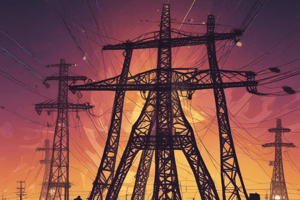Podcast
Questions and Answers
What is the unit of measurement for electric charge?
What is the unit of measurement for electric charge?
- Coulombs (correct)
- Volts
- Amps
- Joules
Who among the following individuals laid the foundations of modern electricity?
Who among the following individuals laid the foundations of modern electricity?
- Galileo Galilei
- Isaac Newton
- Albert Einstein
- Benjamin Franklin (correct)
What is the role of transformers in electricity?
What is the role of transformers in electricity?
- Generating electricity
- Converting electricity into heat energy
- Storing electricity
- Transporting electricity efficiently over long distances (correct)
What is the rate at which electrically charged particles flow through a conductor called?
What is the rate at which electrically charged particles flow through a conductor called?
When was static electricity first discovered?
When was static electricity first discovered?
What is the difference in electrical potential energy between two points in an electric circuit called?
What is the difference in electrical potential energy between two points in an electric circuit called?
What is the core principle behind the operation of capacitors and diodes?
What is the core principle behind the operation of capacitors and diodes?
According to Ohm's Law, what happens to the current through a conductor when the voltage across the two points increases?
According to Ohm's Law, what happens to the current through a conductor when the voltage across the two points increases?
What are the two main types of electricity commonly used in the modern world?
What are the two main types of electricity commonly used in the modern world?
Which renewable energy sources are mentioned as becoming increasingly popular due to concerns about climate change and fossil fuel depletion?
Which renewable energy sources are mentioned as becoming increasingly popular due to concerns about climate change and fossil fuel depletion?
What is the role of transformers in electricity distribution from a power plant to a home?
What is the role of transformers in electricity distribution from a power plant to a home?
What do Kirchhoff's Laws describe in an electric circuit?
What do Kirchhoff's Laws describe in an electric circuit?
Flashcards are hidden until you start studying
Study Notes
Unraveling Electricity: A Journey of Understanding
Electricity is a fundamental part of our daily lives, yet it's a topic we often take for granted. Let's dive into the world of electricity to explore its fascinating history, the invisible forces at play, and the impact this energy source has on our lives.
The Birth of Electricity
Electricity has its roots in ancient civilizations with the discovery of static electricity around 600 BCE by the Greeks and the Lenné brothers in the 17th century who investigated the effects of friction and static electricity. The foundations of modern electricity were laid by Benjamin Franklin and Alessandro Volta, who throughout the 18th century explored the concepts of electricity and invented devices such as the lightning rod and the electric battery.
Electricity's Components: Charge, Current, and Voltage
Electricity is generated by the flow of electrons, which we measure in terms of electric charge (Coulombs), current (Amperes), and voltage (Volts). Charge is the total amount of electrically charged particles in an object; Current is the rate at which electrically charged particles flow through a conductor; Voltage is the difference in electrical potential energy between two points in an electric circuit.
The Magnificent Transformers
Transformers are the unsung heroes of electricity. They're used to change voltages from high to low, enabling the efficient transportation of electricity over long distances. For instance, the voltage from a power plant, which might be 100,000 volts (kV), is reduced to 240 volts (V) at your home, thanks to transformers.
A Tale of Two Charges: Positive and Negative
Electric charge comes in two varieties: positive and negative. Like charges repel, while opposite charges attract each other. This is the core principle behind the operation of capacitors and diodes, two essential components found in almost every electronic device.
The Laws of Electricity: Ohm and Kirchhoff
Ohm's Law and Kirchhoff's Laws are the cornerstones of electric circuit theory. Ohm's Law states that the current through a conductor between two points is directly proportional to the voltage across the two points, while Kirchhoff's Laws describe the conservation of charge and energy in an electric circuit.
Electricity in Action: Devices and Applications
From smartphones and laptops to electric vehicles and power grids, electricity has made the modern world possible. Alternating current (AC) and direct current (DC) are the two main types of electricity we use, each with their unique applications.
A Sustainable Future: Renewable Energy
As global concerns about climate change and the depletion of fossil fuels grow, renewable energy sources like solar, wind, and hydroelectric power are becoming increasingly popular. These clean energy sources are revolutionizing the way electricity is produced and consumed.
As we continue to explore, harness, and innovate with electricity, its role in our lives will only continue to grow. So the next time you flip a switch or charge your phone, remember the incredible journey this energy has taken to reach you.
Studying That Suits You
Use AI to generate personalized quizzes and flashcards to suit your learning preferences.




